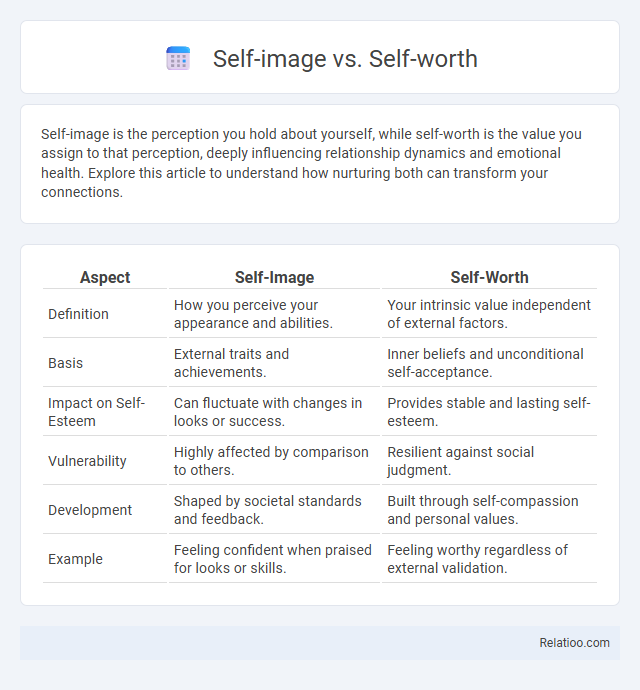Self-image is the perception you hold about yourself, while self-worth is the value you assign to that perception, deeply influencing relationship dynamics and emotional health. Explore this article to understand how nurturing both can transform your connections.
Table of Comparison
| Aspect | Self-Image | Self-Worth |
|---|---|---|
| Definition | How you perceive your appearance and abilities. | Your intrinsic value independent of external factors. |
| Basis | External traits and achievements. | Inner beliefs and unconditional self-acceptance. |
| Impact on Self-Esteem | Can fluctuate with changes in looks or success. | Provides stable and lasting self-esteem. |
| Vulnerability | Highly affected by comparison to others. | Resilient against social judgment. |
| Development | Shaped by societal standards and feedback. | Built through self-compassion and personal values. |
| Example | Feeling confident when praised for looks or skills. | Feeling worthy regardless of external validation. |
Understanding Self-Image: Definition and Importance
Self-image refers to the mental picture or perception one holds about oneself, encompassing physical appearance, personality traits, and abilities. Understanding self-image is crucial as it shapes behavior, influences emotional well-being, and impacts relationships and social interactions. A positive self-image fosters confidence and personal growth, while a distorted self-image can contribute to low self-esteem and psychological challenges.
What is Self-Worth? Exploring the Core Concept
Self-worth represents the intrinsic value and respect you hold for yourself, independent of external achievements or appearances. It is the foundation of emotional well-being, influencing confidence and resilience in various life situations. Understanding your self-worth enables healthier relationships and fosters genuine self-acceptance beyond superficial self-image or fluctuating self-esteem.
Key Differences Between Self-Image and Self-Worth
Self-image refers to how individuals perceive themselves based on appearance, abilities, and personality, while self-worth is the intrinsic value and sense of deservingness one assigns to themselves. Self-image fluctuates depending on external feedback and achievements, whereas self-worth remains relatively stable, grounded in internal beliefs and unconditional self-acceptance. Understanding these distinctions is crucial for personal development, as enhancing self-worth fosters resilience beyond the superficial changes that affect self-image.
How Self-Image Shapes Personal Identity
Self-image significantly shapes personal identity by influencing how individuals perceive themselves and interpret their abilities and worth. This mental representation affects behavior, confidence, and social interactions, thereby reinforcing or altering one's self-worth and overall sense of belonging. Understanding and improving self-image can lead to a more authentic and empowered personal identity.
The Role of Self-Worth in Emotional Wellbeing
Self-worth plays a crucial role in emotional wellbeing by influencing how individuals value themselves beyond external achievements or appearances. Unlike self-image, which reflects perceptions shaped by external feedback and experiences, self-worth is an intrinsic sense of value that fosters resilience and emotional stability. High self-worth enhances mental health by reducing vulnerability to stress and promoting self-compassion, leading to greater overall psychological wellbeing.
Influences on Self-Image: Society, Media, and Upbringing
Society, media, and upbringing play crucial roles in shaping your self-image by influencing perceptions of beauty, success, and worth through cultural norms and standards. Media often portrays idealized versions of life and appearance, which can distort self-perception and affect self-worth, while family and upbringing instill core beliefs and values that form the foundation of how you view yourself. Understanding these influences helps distinguish self-image from self-worth, recognizing that self-worth is an intrinsic value independent of external validation.
Building Authentic Self-Worth: Practical Strategies
Building authentic self-worth involves recognizing intrinsic value beyond external achievements or appearances, distinguishing it clearly from self-image and self-esteem. Practical strategies include practicing self-compassion, setting healthy boundaries, and engaging in positive self-affirmations to reinforce an accurate and kind perception of oneself. Cultivating mindfulness and reflecting on personal values also strengthen genuine self-worth by aligning actions with true identity rather than superficial self-image.
Common Myths About Self-Image and Self-Worth
Common myths about self-image and self-worth include the false belief that self-worth depends solely on external achievements or approval, which overlooks intrinsic value based on inherent qualities. Another misconception is that self-image must be flawless, leading to unrealistic expectations and negative self-judgment when imperfections arise. Understanding the distinction between self-image--the mental picture of oneself--and self-worth--the fundamental sense of value--helps debunk myths and fosters healthier self-perception and emotional resilience.
Signs of Unhealthy Self-Image vs Low Self-Worth
Signs of an unhealthy self-image include constant self-criticism, distorted body perception, and avoidance of social situations due to fear of judgment, while low self-worth manifests as pervasive feelings of inadequacy, difficulty accepting compliments, and reluctance to pursue goals due to self-doubt. An unhealthy self-image primarily affects how individuals perceive their appearance and abilities, whereas low self-worth impacts their overall value and deservingness of respect and happiness. Recognizing these distinct signs is crucial for targeted interventions in mental health and personal development.
Cultivating Balance: Integrating Self-Image and Self-Worth
Cultivating balance between self-image and self-worth involves recognizing that your self-image is how you perceive your external appearance and abilities, while self-worth reflects the intrinsic value you assign to yourself beyond external factors. Fostering harmony between these aspects encourages resilience and authentic confidence, enabling you to appreciate your unique qualities without relying solely on external validation. Integrating self-image and self-worth supports emotional well-being by promoting a stable sense of identity rooted in self-acceptance and personal growth.

Infographic: Self-image vs Self-worth
 relatioo.com
relatioo.com